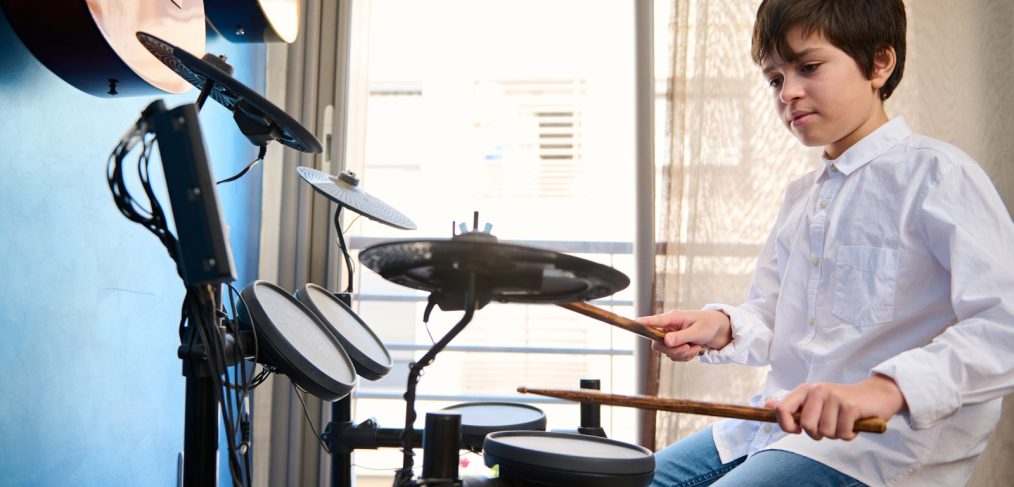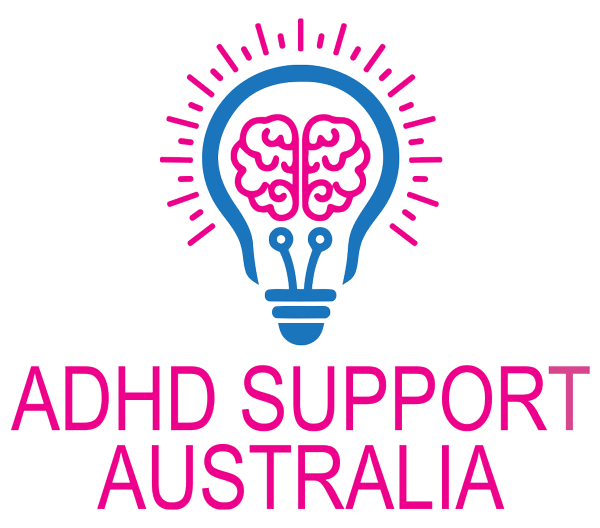
ADHD And Online Drum Lessons: Guidelines And Common Questions/Apprehensions
Online drum lessons can be a fun, flexible way for people with ADHD to learn and thrive. This guide from Go Mad Music shares practical tips and answers common questions—proving that with the right setup and mindset, anyone can start drumming, no kit required.
Go Mad Music’s TOP 5 guidelines for ADHD and online classes (Many of these points can apply to other instruments)
1: Have everything laid out. That’s the drum kit, practise pads or even just the sticks – and the notation. Keep it set up and in a position where you can see it everyday and it’s ready to rock.
2: Schedule! Schedule! Schedule! And keep that ROUTINE! This is setting aside a time of day (everyday) for practise.
3: Make a chart to track your practise – log the time and day, and amount of time spent behind the kit. You could take it a step further and note down any achievements you made during the session or certain aspects you feel could use more attention the next time you practise. It’s often difficult to notice your own progress as we’re too close to the picture, so these logs can be a great way to step back and see what you’ve achieved.
4: ROUTINE – AGAIN! Turn it into a ritual… and stick to it. This is so important it has to be mentioned again.
5: Be kind to yourself, and don’t take it too seriously… if you don’t get the exercise or song straight away just remember it will take time, and take your time to progress and develop. Practise makes progress, not perfect.
Remember that it’s play time (doesn’t matter how old you are, that’s what it is) we play the drums, we don’t do them, we play music for fun and enjoyment and for a break from the norm. If you don’t achieve a particular outcome from a class or practise immediately, that’s okay, as long as you had fun banging on the drums! There’s always next time, but keep at it and don’t give up, it will come – the feeling of getting it down will be so gratifying!
Below are some commonly asked questions we’ve had at Go Mad Music about having ADHD and learning drums online.
* Can I do online lessons if I have ADHD?
Absolutely! Many students find online to be their preferred method of learning, but of course it doesn’t work for everyone. Learning from home can be incredibly relaxing for the student with them being in their own environment; this is important when learning something new, as well as learning from someone new.
A note though; set up in a room with as few distractions as possible… for example a bedroom full of toys might not be the best idea, however anywhere at home should still feel comfortable. Being comfortable can increase levels of enjoyment and engagement which can help with that all important daily practise, that may also lead to progressing to the next goal sooner!
* How does it work online – sound wise and with cameras?
Many students and parents of students contemplating online lessons wonder how it would work in terms of sound and cameras? “Do I need to buy loads of professional gear, cameras and microphones?”
Many students and parents of students contemplating online lessons wonder how it would work in terms of sound and cameras? “Do I need to buy loads of professional gear, cameras and microphones?”
Not at all…
Truth is – the tutor doesn’t necessarily need to even hear you play! As long as they have a clear view of you behind the drums and can see your arms and legs – that’s perfect for a class, and to still make great progress in music. This may not necessarily apply to all instruments but definitely does work with drums online. You don’t need professional cameras to achieve this either, just a phone, tablet or computer and a good internet connection will be fine.
You don’t really even need a drum kit to get going, which leads to the next point…
* What if I’m not 100% sure drums are for me? Do I need to find a drum kit to do online lessons?
As mentioned, you don’t actually need a drum kit to get started. Buying or renting a kit is a big investment and while having a kit may lead to more enjoyment as you’re playing, which can lead to progressing sooner, it’s not essential for getting going… hands and knees, pillows, old magazines/books, a couch, chairs, or even the foot of a bed will work just as well for building coordination, rhythms and muscle memory.
Sticks are a bonus if you don’t have a kit and are an inexpensive way of making lessons and practise without drums that bit more exciting and making practise more engaging.
Going about it this way will also certainly help you determine if you (or your child) want to pursue drums further; then later on can visit the idea of looking into getting a set of your own.
* Are online sessions as engaging as it would be in person?
They absolutely can be! But this is an aspect that is very much a case-by-case type situation. For many ADHD’ers it works; but for many it simply doesn’t. And that’s alright, everyone learns differently. The advice here is to find a tutor who will offer a free trial, and then give it a go!
* Which video platforms work the best and is a phone/tablet/computer better?
The whole URL tour works… FaceTime and Skype have the best default sound and settings for instruments, while Zoom has a music sound setting (also called “enable original sound” on Apple devices) which needs to be turned on each time; but it still works well. One might not think it, but actually what’s more important is having a stable connection and clear video, before sound.
In terms of device, a phone can work just as well as the larger screen of a tablet or computer. There is no one better option, this is down to the student and whether they are happy or not viewing on a smaller screen rather than a larger one. As long as you can see what you need to from the tutor clearly enough.
* Does age factor in at all?
Never too old to learn! On the other hand, it’s completely case-by-case again in terms of how young is appropriate to start… Some, as young as 3 year olds, are just naturally musically inclined; in this instance, before incorporating the feet, they would generally do exercises and songs that focus more on hand-eye coordination and rhythms – which also aids in the development of motor skills.
* Can you be an absolute beginner if you’re older?
It doesn’t matter if you’re retired or have just learnt to walk, anyone can start from scratch, i.e. having zero prior musical tuition or knowledge. As long as there’s a passion for music and a desire to want to learn, then absolutely anyone can do it!
* If you’re Australian, do you need to have a tutor in Aus? Or what if I’m not in Aus?
There are amazing instructors all around the world. Being online effectively means lessons can take place from anywhere around the globe; it’s just a matter of navigating time differences. So it doesn’t matter where you or your tutor are in the world, so long as you can find a time that works for you both. Some tutors do lessons at 2-4am in their country with students on the other side of the globe.
* What if I am an adult and have no rhythm!?
This is a common misconception that someone may not have rhythm; fact is if we had no rhythm, we wouldn’t be able to walk, talk, breathe, and our hearts wouldn’t beat – it is innately in everyone. There are musically inclined people who will reach a certain level, the same as everyone, but it’s a level that can only be surpassed with practise, same as everyone.
A fundamental aspect again, is the true desire to want to learn the instrument, and have the passion to stick with the practise. The truth is it takes time and practise, but don’t give up – it’s incredibly fun and immensely rewarding when you do get a beat, rhythm or song down successfully. Strive for these wins while having an absolute blast smashing the drums and playing music! If it was easy, then anyone could do it and it wouldn’t make what we’re trying to accomplish here so special.
* If I try online and don’t like it, should I try again with a different tutor?
Short answer, yes. Not everyone has the same knack for teaching online as they do in-person; this doesn’t mean they’re not a good teacher, it could just mean that they have better engagement in person.
A major factor for any medium of lesson is the rapport between student and tutor. You may have the best, most qualified and skilled teacher in the world, but if the relationship between you and them isn’t there, it won’t work; or at least won’t be as enjoyable which can mean that you may not improve as much.
So, yes, if at first it didn’t seem like the right fit (and if online seems more practical to you) it’s definitely worth trying another teacher – just to be sure.
However, if online is what you’re truly after but you’re really struggling to connect with any live tutor, or maybe not able to stick to a class time because of scheduling, then luckily there are other options; these include:
- Lessons that could be pre-recorded videos which are sent to you, these are still individualised to you and develop with you, but are not live with instant feedback and a bit of back and forth.
- There are also pre-recorded videos that are accessible by any student on a particular platform, i.e. aimed at a larger group, these would be totally generalised and not specific to the needs and strengths of an individual student; you’d need to select an appropriate level that may suit your abilities and determine for yourself which area you want to work on.
None of these are better than the other, they may all have their pros, and they may all have their cons. It depends on the student and how you learn, and what will work best for you. This is why you need to not be afraid to explore the options… and if one type doesn’t work (and you’re really keen on learning the instrument online) then don’t give up – try the next available option, and keep going until you find a tutor, a format, and a style that works for you.
To conclude:
Online lessons can be an amazing way to learn drums (or any instrument for that matter) in a familiar environment. And being at home means being comfortable and relaxed, which is very important when it comes to ADHD students and learning.
If you want to learn then give it a shot. It might not work… but you might also find it’s the best version of learning an instrument for you.
And we must above all else remember that we PLAY music and the drums, we don’t DO it… it’s supposed to be fun no matter how you approach it, and no matter how you progress with the instrument… just have fun!
Check out www.gomadmusic.com for ADHD specific online drum lessons for all ages.

The author, Lee Havenga, is head tutor and founder of Go Mad Music
Go Mad Music offers speciality ADHD drum lessons for all ages in and around the Northern Beaches of Sydney and now also ONLINE. Established in 2013 as part of a Bachelors of Music degree, the Go Mad Drumming method has continually been growing over the years with Lee, the head tutor and founder. Lee then went on to complete a Masters in Applied Psychology with a focus on ADHD to further his knowledge and expand the course material.
Find out more about Lee, Go Mad Music and online drumming lessons here.
